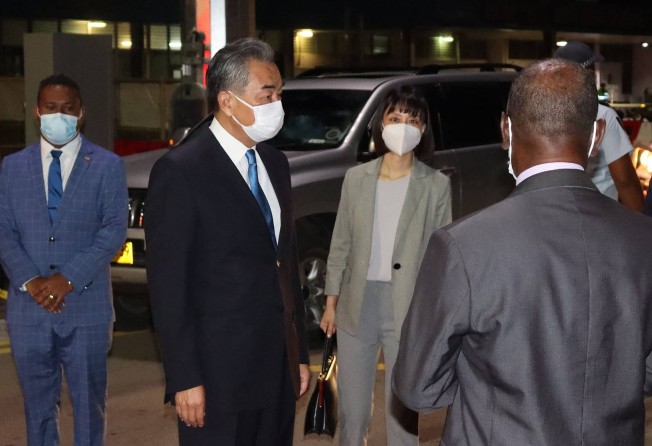
Chinese foreign minister points to Solomons as ‘model for mutual trust’ at start of Pacific tour
- Wang Yi is on a 10-day trip aimed at expanding Beijing’s military, economic and diplomatic ties in the region
- He sought to play down fears of a military presence in the nation under new security pact, according to Xinhua

China’s ties with Solomon Islands should become “a model for mutual trust” and cooperation for its relations with the South Pacific, Foreign Minister Wang Yi said in Honiara at the start of a regional tour on Thursday.
The 10-day, eight-nation trip is aimed at expanding China’s long-term military, economic and diplomatic ties and is seen as an effort to counter Washington’s Indo-Pacific strategy.
It comes after Beijing signed a security pact with Solomon Islands in April that has raised fears in the region that China could get a military foothold in the Pacific island nation.
Meeting the archipelago’s acting governor general Patteson Oti, Wang praised Honiara’s 2019 decision to end 36 years of official ties with Taipei and establish diplomatic relations with Beijing as “a historical inevitability”, according to Chinese state news agency Xinhua.
Wang sought to play down concerns about a potential Chinese military presence in the Solomons, the report said, without giving further details. He said bilateral ties had achieved “tangible” results with stronger “all-round development” and “mutual political trust”.
He also set the tone for the tour, which will include a stop in Fiji on Monday, where Beijing hopes to sign a wide-ranging agreement and five-year action plan with regional foreign ministers.
“China will continue to uphold the spirit of South-South cooperation of mutual support and mutual assistance, and help the people in the countries improve their living standards and accelerate development and revitalisation,” he said.

Wang also met his Solomon Islands counterpart Jeremiah Manele, with the two nations agreeing to jointly build a major project under Beijing’s Belt and Road Initiative, and to cooperate in areas such as agriculture, fisheries, timber and pandemic prevention, according to China’s foreign ministry.
The tour takes in seven countries Beijing hopes will endorse its “Common Development Vision” – the Solomons, Kiribati, Samoa, Fiji, Tonga, Vanuatu and Papua New Guinea. He will hold virtual talks with the other three potential signatories – the Cook Islands, Niue and the Federated States of Micronesia. Wang will also visit East Timor.
His trip is being closely watched by Washington and its allies, which traditionally have close ties with the South Pacific. Although Honiara has said it will not host a Chinese military base, the US, Australia and Japan all sent delegations to Solomon Islands last month to express concern over its closer ties with China.
Beijing is seeking a robust security presence in the region, with proposals to train Pacific police officers, team up on “traditional and non-traditional security” and expand law enforcement cooperation, according to a leaked draft of the proposed agreement seen by Associated Press.
Apart from a potential free-trade agreement, China also wants to develop a marine plan for fisheries, which would include the Pacific’s lucrative tuna catch, and to boost cooperation on running the region’s internet networks, as well as set up cultural Confucius Institutes and classrooms.
It would also require the Pacific nations to “firmly abide” by the one-China principle, under which Taiwan, a self-ruled island democracy, is considered by Beijing to be part of China.
“This is China seeking to increase its influence in the region of the world where Australia has been the security partner of choice since the second world war,” new Australian Prime Minister Anthony Albanese warned on Thursday.
Albanese vowed to “step up, not step back” in Pacific engagement in an interview and sent Foreign Minister Penny Wong to Fiji on Thursday in a scramble to secure its traditional ties with the nation. The pair had just returned from the Quad summit in Tokyo, meeting US President Joe Biden and leaders from India and Japan to counterbalance China’s growing military clout in the region.
US State Department spokesman Ned Price warned the countries in question to be wary of “shadowy” agreements with China. “We are concerned that these reported agreements may be negotiated in a rushed, non-transparent process,” Price said on Wednesday, adding that Pacific nations would make their own sovereign choices.
New Zealand Prime Minister Jacinda Ardern also voiced concern about China’s latest push in the region, saying the South Pacific can handle its own security needs.
According to Pang Zhongying, an international affairs expert at Ocean University of China in Qingdao, Wang’s high-profile tour is clearly aimed at the US Indo-Pacific strategy, especially given Washington’s efforts to engage in the region.
“It is a critical time for Beijing and China needs to tread carefully with its ties with Australia’s new government and New Zealand amid its perceived push for a greater presence in the South Pacific, their perceived sphere of influence,” Pang said.
In addition, Beijing’s proposed cooperation agreement may not get a warm reception in Micronesia. President David Panuelo has told leaders of the other Pacific nations that Micronesia will not endorse the plan and warned that it “threatens to bring a new Cold War era at best, and a world war at worst”, according to AP.
Still, China’s foreign ministry declared in a document released on Tuesday that Beijing’s ties with the South Pacific had entered a “new stage of rapid growth”. The document details China’s exchanges and cooperation with the region of “good friends” since it established diplomatic ties with Fiji in 1975. According to the document, China’s direct investment in the region had reached US$2.72 billion by 2021, with the total trade volume expanding from US$153 million in 1992 to US$5.3 billion last year.